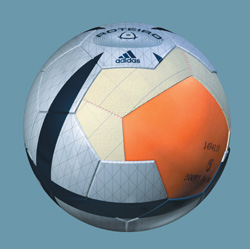Football is played in accordance with a set of rules known as the Laws of the Game. The game is played using a spherical ball, known as the football. Two teams of eleven players each compete to get the ball into the other team's goal between the posts and under the bar, thereby scoring a goal. The team that has scored more goals at the end of the game is the winner; if both teams have scored an equal number of goals then the game is a draw. Each team is led by a captain who has only one official responsibility as mandated by the Laws of the Game: to be involved in the coin toss prior to kick off or penalty kicks.
The primary law is that players other than goalkeepers may not deliberately handle the ball with their hands or arms during play, though they do use their hands during a throw in restart. Although players usually use their feet to move the ball around, they may use any part of their body notably, "heading" with the forehead other than their hands or arms. Within normal play, all players are free to play the ball in any direction and move throughout the pitch, though the ball cannot be received in an offside position.
In typical game play, players attempt to create goal scoring opportunities through individual control of the ball, such as by dribbling, passing the ball to a team mate, and by taking shots at the goal, which is guarded by the opposing goalkeeper. Opposing players may try to regain control of the ball by intercepting a pass or through tackling the opponent in possession of the ball; however, physical contact between opponents is restricted. Football is generally a free-flowing game, with play stopping only when the ball has left the field of play or when play is stopped by the referee for an infringement of the rules. After a stoppage, play recommences with a specified restart.
Majority of people has purchased their Olympic Football Tickets for Olympic 2012. If you want to watch live, you should have to hurry up and buy your Football Tickets. Global Ticket Market offers you all sorts of Olympic Tickets at very cheap rates. You can buy any of Olympic Tickets including Olympic Football Tickets from Global Ticket Market easily, securely and at very favorable rates.



















